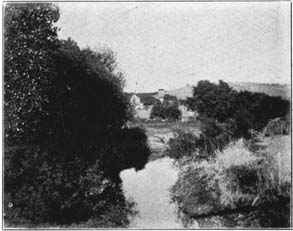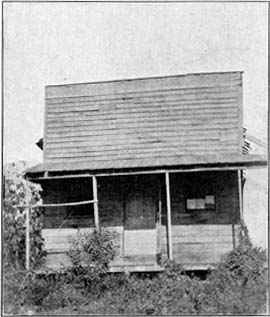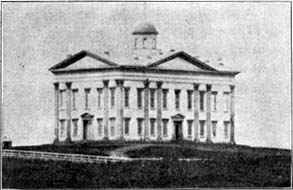|
CHAPTER IX
Old State Capitol Building, Omaha Almost as soon as the territory of Nebraska was born eager minds within her borders were looking forward to the time when she should stand an equal in the sisterhood of states. In 1858 the movement for immediate statehood began. The Omaha Times of May 13, 1858, asks for an expression of opinion on the question. On June 24 of the same year in an editorial, "The State of Nebraska," its editor, W. W. Wyman, discussed the objections to state organization and advocated the election of a legislature pledged to submit the proposition to the people. The next year both democratic and republican parties in their territorial conventions declared for immediate statehood. Governor Black in his message to the legislature which met December 9, 1859, advocated state organization, saying that Nebraska had about 50,000 population--which statement a census at that time would not have verified. 
Scene Near Weeping Water, Nebraska. |
fairs. It was not until April 19, 1864, that congress took the matter in hand and passed an enabling act to permit Nebraska to form a state constitution. As has frequently happened in politics there was a change of party attitude. The democratic party which had been the pioneer in demanding statehood in 1858 now opposed the movement as premature and calculated to impose burdens on the frontier population which it was not prepared to undertake. The republican party, which had taken on, temporarily, the convenient name of "Union" in order more easily to secure the support of the war democrats, resolved strongly in favor of immediate statehood. 
Gov. Crounse's First Residence and Law Office at Rulo
1864. Photo Taken in 1901 named J. Sterling Morton for governor and resolved against statehood. The chief reasons offered for and against the organization of a state were those of economy,--the democrats maintaining that it was better to maintain a territorial government which was largely supported by appropriations from congress, until the population became greater,--the republicans contending that a state government would be no more expense than a territorial one to the people, when the advantages of income from congressional land grants was taken into account, and that it was better for the people to govern themselves anyway than to be ruled from Washington. The real difference was, however, one of politics. The republicans wanted another state in the Union to help carry out their reconstruction program and overcome the opposition of President Andrew |
 |
 |
 |
 |
|
@ 2002 for the NEGenWeb Project by Pam Rietsch, Ted & Carole Miller |
|||
